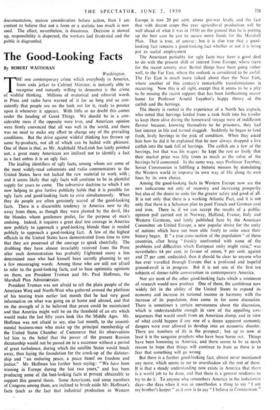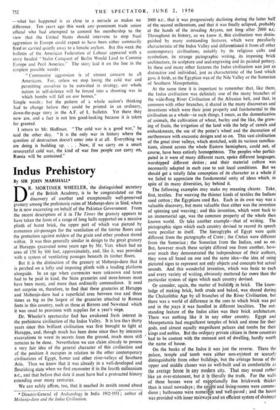The Good-Looking Facts
By ROBERT WAITHMAN Washington.
The leading identifiers of ugly facts, among whom are some of the most widely-read columnists and radio commentators in the United States, have not lacked the raw material to work with ; and it seems likely that ugly facts will continue to be in plentiful supply for years to come. The subversive doctrine to which I am now helping to give furtive publicity holds that it is possible for ugly facts and good-looking facts to exist simultaneously. When they do people are often genuinely scared of the good-looking facts. There is a discernible tendency in America now to shy away from them, as though they were planted by the devil, like the blondes whom gentlemen prefer, for the purpose of man's undoing. Indeed, it requires a great deal less courage in America now publicly to approach a good-looking blonde than is needed publicly to approach a good-looking fact. A few of the highest officials in the United States have demonstrated from time to time that they are possessed of the courage to speak cheerfully. The drubbing they have almost invariably received from the Press after each demonstration has probably frightened many a less determined man who had himself been secretly planning to say a few encouraging words. Among those who are still not afraid to refer to„the good-looking facts, and to base optimistic opinions on them, are President Truman and Mr. Paul Hoffman, the Marshall Plan Administrator.
President Truman was not afraid to tell the plain people of the American West and North-West who gathered around the platform of his touring train earlier last month that he had very good information on what was going on at home and abroad, and that on. the strength of it he believed that peace could be maintained and that America might well be on the threshold of an era which would make the last fifty years look like the Middle Ages. Mr. Hoffman was not afraid to say, also last month, to the unsenti- mental business-men who make up the principal membership of the United States Chamber of Commerce that his observations led him to the belief that the power of the present Russian dictatorship would not be passed on to a successor without a period of great turbulence, during which the satellite States would break away, thus laying the foundation for the crack-up of the dictator- ship and " an enduring peace, a peace based on freedom and justice." Mr. Hoffman has further been saying: " We have been winning in Europe during the last two years," and has been producing some of the best-looking facts at present obtainable to .support this general thesis. Some Americans, and some members of Congress among them, are inclined to brush aside Mr. Hoffman's facts (such as the fact that industrial production in Western Europe is now 20 per cent. above. pre-war levels, and the fact that with decent crops this year agricultural production will be well ahead of what it was in 1938) on the ground that he is putting up the best case he can to secure more funds for the Marshall Plan. That is true, of course : but it is also true that a good- looking fact remains a good-looking fact whether or not it is being put to useful employment
The American partiality for ugly facts may have a good deal to do with the present shift of interest from Europe, where (save for the recent anxiety over Berlin) things have been going rather well, to the Far East, where the outlook is considered to be awful. The Far East is much more talked about than the Near East, where another of this century's remarkable transformations is occurring. Now this is all right, except that it seems to be a pity to be missing the recent support that has been forthcoming nearer home for Professor Arnold Toynbee's happy theory of the catfish and the herrings.
The theory is rooted in the experience of a North Sea captain, who noted that herrings landed from a tank built into his trawler to keep them alive during the homeward voyage were of indifferent flavour because, knowing themselves to be prisoners, they had lost interest in life and turned sluggish. Suddenly he began to land fresh, lively herrings in the pink of condition. When they asked him how he did it he explained that he now always dropped a live catfish into the tank full of herrings. The catfish ate a few of the herrings, but that was his wages: he kept the rest so lively that their market price was fifty times as much as the value of the herrings he'd consumed. In the same way, says Professor Toynbee, Soviet Communism is fulfilling a historic mission by stimulating the Western world to improve its own way of life along its own lines by its own choice.
Among the good-looking facts in Western Europe now are the new indications not only of recovery and increasing prosperity but also of the desire to unite for the greater safety and good of all. It is not only that there is a working Atlantic Pact, and it is not only that there is a Schuman plan to pool French and German coat and iron. There is, if we can accept the results of a public- opinion poll carried out in Norway, Holland, France, Italy and Western Germany, and lately published here by the American Committee on United Europe, a new popular desire for the unity of nations which have not been able freely to unite since their history began. If " a true cross-section of the population " of these countries, after being " frankly confronted with some of the problems and difficulties which European unity might raise," was nevertheless 64 per cent. in favour of union, 9 per cent. against and 27 per cent. undecided, then it should be clear to anyone who has ever travelled through Europe that a profound and hopeful ground-swell is in progress. But it is not one of the first ten subjects of dinner-table conversation in contemporary America.
Nor are most of the other good-looking facts which a minimum of research would now produce. One of them, the confidence now widely felt in the ability of the United States to expand its economy and increase its national income in harmony with the increase of its population, does come in for some discussion. There is sometimes a certain nervousness about the discussion, which is understandable enough in view of the appalling con- sequences that would result from an American slump, and in view of what could happen if any one of a dozen apparent economic dangers were ever allowed to develop into an economic disaster. There are numbers of ifs in the prospect ; but up to now at least it is the sanguine prophets who have been borne out. Things have been humming in America, and there seems to be as much reason to hope that things will continue to hum as there is to fear that something will go wrong.
But there is a further good-looking fact, almost never mentioned any more, which seems to me to overshadow all the rest of them. It is that a steady understanding now exists in America that there is a world job to be done, and that there is a general readiness to try to do it. To anyone who remembers America in the isolationist days—the days when it was as unorthodox a thing to say " I am my brother's keeper " as it now is to say " I believe in Communism " —what has happened is as close to a miracle as makes no difference. Ten years ago this week any prominent trade union official who had attempted to commit his membership to the view that the United States should intervene to stop Nazi aggression in Europe could expect to have been either summarily firednr carried quietly away to a lunatic asylum. But this week the bulletin of the American Federation of Labour appeared with a story headed " Stalin Conquest of Berlin Would Lead to Commie Europe and Peril America." The story laid it on the line in the simplest possible words: " Communist aggression is of utmost concern to all Americans. For, unless we stop losing the cold war and permitting ourselves to be outwitted in strategy, our whole nation in self-defence will be forced into a shooting wai in which bombs will fall on our homes."
Simple words ; but the pattern of a whole nation's thinking had to change before they could be printed in an ordinary, down-the-page story in the A.F. of L. bulletin. Yet there they now are, and a fact is not less good-looking because it is taken for granted.
I return to Mr. Hoffman. " The cold war is a good war," he said the other day. " It is the only war in history where the question of destruction doesn't enter into it at all. Everything we are doing is building up. . . . Now, if we carry .on a smart resourceful cold war, the kind of war free people can carry on, Russia will be contained."



































 Previous page
Previous page